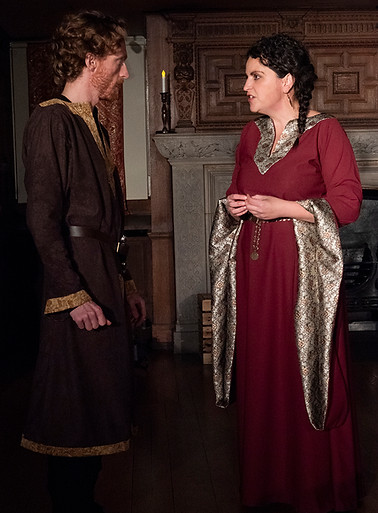Macbeth

Macbeth by William Shakespeare was directed by Jan Rae. It was performed at Kingswood Arts, West Dulwich, SE21 from the 1st - 4th November 2023





CAST IN ORDER OF APPEARANCE
Weird Sisters
Duncan, King of Scotland
Lennox, a thane
Malcolm, elder son of Duncan
Donalbain, younger son of Duncan
Captain
Ross, a thane
Angus, a thane
Macbeth, thane of Glamis
Banquo, a thane
Lady Macbeth, Countess of Glamis
Gentlewoman
Porter
Macduff, thane of Fife
Fleance, Banquo’s son
Murderers
Lady Macduff, Countess of Fife
Young Macduff
Doctor
Seyton, manservant to Macbeth
Directed by Jan Rae
Fight Director : Steve Borrie
Stage Manager:
Assisted by:
Prop Construction
Master Swordsmith
Lighting
Sound Design
Sound Operation
Costumes
Hair & Make Up
Poster Design
Box Office
Rebecca Dallaway
Michelle Cathcart
Katrina Rublowsky
Paul Sykes
Mitch Siddons
Chloe Couper
Alex White
Peter Tilly
Hugh Blake-James
Daniel Aarons
Mark Kelleher
Hannah Tomlinson
Jude Benning
Alex White
Paul Sykes
Adam Lowe
Alex White
Daniel Aarons
Peter Tilly
Rebecca Dallaway
Alex White
Peter Tilly
Paul Sykes
Kevin Edwards
Tracy Brook
Sheree Clapperton
Heather Wilcox
Geoff Higginsbottom
James O'Connor
Roger Orr
James Brown
Georgina Hickleton
Judy Douglas
Denise Biffin
Clarisse Hassan
Jane Jones





REVIEW
by Mike Foster
Macbeth is, beyond doubt, one of Shakespeare’s great tragedies, but it also played a key role in his plan to cultivate a new royal patron, King James I. To achieve this Shakespeare seized on James' suspicion of the baleful influence of women over men, hatred of regicide and determination to reinforce the union of his native land of Scotland with England through his own coronation.
In his play, the baleful words of four women - the witches and Lady Macbeth - nudged Macbeth into seizing the crown by killing Duncan, King of Scotland. Macbeth's wicked deeds led to regicide. Only England’s army; Duncan's true heir and a supportive nobility could overthrow Macbeth and bring lasting peace to a suffering kingdom. Audiences loved the play. James I liked the messaging. Tomorrow and tomorrow…Shakespeare’s future as a playwright was assured. And, as a mark of esteem, James graciously agreed that his players should be named the King’s Men.
The Dulwich Players’ production, directed by Jan Rae, was based at Kingswood Hall, which felt an unusual choice at the outset. But its dark timber and grand staircase , produced a brooding presence appropriate to the play. Jan made good use of every available exit, and some of the tableaux, where actors stood on stairs and stage - for example, after the murder of the King - were stunning.
The production brought pace and atmosphere from the very beginning when the weird sisters/witches (Rebecca Dallaway, Michelle Cathcart, Katrina Rublowsky) appeared, on high, on a balcony above the stage with excellent smoke and thunder FX.
Kingswood was a challenging venue for lights but they were used effectively in this, and other scenes thanks to a lighting team led by Roger Orr. The later reappearance of the witches on the stage was less dramatic but their malevolence was omnipresent.
Macbeth (Mark Kelleher) was played con brio, starting as a man admired by his success in battle, and promotion. As his killing spree began, Macbeth descended to hell. But this was a difficult transition: Mark took us through astonishing bouts of self-doubt, madness and fury before he became the psychopath he was never destinied to become. He dominated the play, as was only right.
Lady Macbeth (Jude Benning) fed her husband’s demons with greater sympathy than I have seen in the past. Her “Out Damned Spot” speech was highly charged. I was only amazed that she remembered to pick up her candle to go back upstairs when she finished it. Her agony was witnessed by a deeply concerned Peter Tilly, bouncing back from his early roles as the wounded army captain and a sinister murderer.
Macbeth’s early friend Banquo was played well as a sympathetic victim by Hannah Tomlinson. The witches forecast that Banquo would produce a royal line, which would ultimately include James I himself. Shakespeare brought him back on stage as a troubled ghost, to remined Macbeth of his growing depravity.
Duncan of Scotland was portrayed with great elegance by Paul Sykes. Following his murder, I was a little confused to see him revived and performing from the balcony but realised he was playing the role of the Porter, and none could do it better! Congratulations must also go to Chloe Couper, Malcolm, Duncan's elder son, as she sought to bring peace to his land.
Macduff (Adam Lowe) portrayed a decent man, uncertain which way to act, as Macbeth's depravity developed. The decision was made for him, as Macbeth ordered the murder of his family (Rebecca Dallaway and Alex White, (effectively playing the sons of three murdered parents!) and guaranteed his doom. Steve Borrie should also take a bow as fight director, (both for the two murder scenes and for Macbeth and Macduff's battle scene) and Judy Douglas for costume design in every scene!
And finally, congratulations to the thanes (Hugh Blake-James, Daniel Aarons, Mitch Siddens). Their individual realisations that Macbeth needed to be brought down for the sake of his subjects was reluctant, but inevitable and subtly played . Malcolm even presented them with English earldom for their efforts, although, with the appearance of Fleance on the balcony after Malcolm's speech it is likely that the violence would not be at an end.


